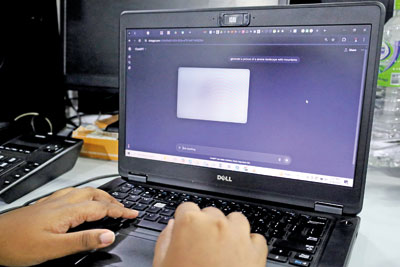News
Saviour and scourge: AI needs regulation, say experts
View(s):By Minaza Hassan
As the use of generative AI (gen-AI) continues to grow, with more people downloading GPT apps and signing up for accounts, cybercrimes including online scams and child sexual harassment have also increased, with around 6,000 social media related incidents reported by the end of July, including 400 online scams and 20 child sexual harassment cases, said Lead Information Security Engineer at Computer Emergency Readiness Team (CERT), Charuka Damunupola.
While gaps in access remain, the growing internet infrastructure including widespread mobile data coverage enables more people to connect with generative AI at various levels, said Mr. Damunupola.

Pic by Eshan Fernando
However, at present, there are no separate statistics in Sri Lanka for online crimes specifically facilitated by AI, including generative AI. Law enforcement records general reports of online scams and related incidents, but these are not flagged as AI generated because often complainants do not know whether AI was involved.
However, certain patterns have been observed. A common case involves AI manipulated images targeting schoolgirls, particularly those participating in large Telegram groups linked to tuition or private classes. These groups can have between 1,000 and 1,500 members, creating opportunities for malicious actors to circulate manipulated content where offenders would obtain public profile photos and use AI tools to create realistic nude photos, said Mr. Damunupola.
These AI generated images are then used to threaten victims. This type of AI manipulated image abuse has been reported in at least five or six documented cases at CERT, said Mr. Damunupola.
Similar technology has also been used in deepfake incidents involving political figures, religious leaders, entrepreneurs, and businesspeople. In some of these cases, deepfakes were used to spread misinformation or lure people into pyramid schemes and phishing scams, explained Mr. Damunupola.
Sri Lanka does have proper AI related policy strategies in place, but the country has not yet reached a stage where these issues can be fully addressed. One of the main reasons is that most of the platforms hosting AI generated images are controlled by large international companies. Since these platforms operate outside Sri Lanka’s jurisdiction, any laws or regulations we introduce often cannot be enforced against them. This creates a significant practical challenge in bringing such legal provisions into effect, said Mr. Damunupola.
In government and public life, deepfakes can falsely depict officials saying, doing, or agreeing to things they never did. Such content can have serious consequences, particularly for marginalised groups, due to the potential for targeted harm. Minority communities are also at heightened risk, as synthetic media can amplify existing prejudice and abuse online, said researcher and analyst, Dr. Sanjana Hattotuwa.
In contexts like Sri Lanka, synthetic media can act as a force intensifying long standing social divisions. With the use of gen-AI, any existing communal, racial, ethnic, or religious tensions can be exploited to provoke fear and deepen divides, combining believable but false content.
One way to address this is through the normalisation of the use of technical standards such as Content Credentials and C2PA, which clearly indicate when generative AI has been used to produce content. For example, a news organization can apply these standards to show that an image was AI-generated, providing greater accountability and transparency.
As open, cost-free standards, they can be adopted by media outlets, NGOs, and government bodies alike, helping ensure easy identification of synthetic content.
Secondly, for AI-generated content, the establishment of an independent oversight body that would ideally be government-led that regulates such content and provides a channel for the public to review and report concerns would provide further security, said Dr. Hattotuwa.
While Sri Lanka’s Online Safety Commission under the OSA could theoretically serve this role, the law itself is controversial and cannot be promoted, said Dr. Hattotuwa.
However, Gen-AI is not inherently negative. Beyond the popular awareness of tools like image generators or chatbots, there are vast and valuable applications in fields such as environmental science, medical research, and academic study, said Dr. Hattotuwa.
For example, it can assist in reconstructing lost languages like hieroglyphics or Mayan scripts, enabling researchers to better understand the cultures, histories, and lived experiences of past civilizations. In such contexts, the technology can be profoundly beneficial, said Dr. Hattotuwa.
A National AI strategy was developed and finalised last September, but it has not yet been published officially, said Dr. Romesh Ranawana, chairman of the AI advisory committee, disbanded a few months ago.
The strategy outlines how to drive national AI adoption, develop skills, stimulate the private sector, and implement AI in government, while also including guidance on handling data and a regulatory roadmap with several recommendations.
However, a legal committee was set up after the disbandment of the advisory
committee.
“The committee assessed existing protections and identified gaps by comparing current laws against the needs posed by AI. They are now in the final stages of drafting a white paper, which will present a set of recommendations for how Sri Lanka should approach its AI regulatory roadmap. Most recommendations do not propose a separate AI law. Instead, they suggest amending existing legislation to incorporate AI-specific provisions to address identified gaps”, said Dr. Ranawana.
The committee is to present the white paper to the Minister of Digital Economy in the coming weeks, said Dr. Ranawana.
They have recommended that the document then be opened for public consultation, allowing various stakeholders to review it, identify gaps, and provide feedback on what might be missing or excessive.
The best way to say that you found the home of your dreams is by finding it on Hitad.lk. We have listings for apartments for sale or rent in Sri Lanka, no matter what locale you're looking for! Whether you live in Colombo, Galle, Kandy, Matara, Jaffna and more - we've got them all!

